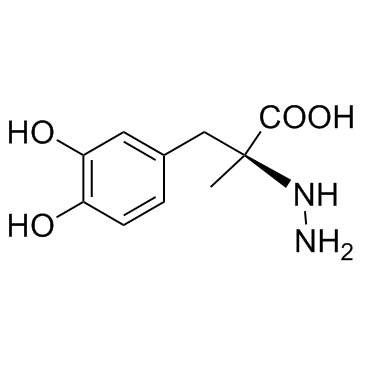Carbidopa

Carbidopa structure
|
Common Name | Carbidopa | ||
|---|---|---|---|---|
| CAS Number | 28860-95-9 | Molecular Weight | 226.23 | |
| Density | 1.4±0.1 g/cm3 | Boiling Point | 528.7±50.0 °C at 760 mmHg | |
| Molecular Formula | C10H14N2O4 | Melting Point | 206 - 208ºC | |
| MSDS | Chinese USA | Flash Point | 273.5±30.1 °C | |
|
A misguided 'pill in the pocket' approach with flecainide leading to cardiac arrest.
BMJ Case Rep. 2012 , doi:10.1136/bcr-2012-006868, (2012)
|
|
|
Beneficial effects of natural phenolics on levodopa methylation and oxidative neurodegeneration.
Brain Res. 1497 , 1-14, (2013) Levodopa (L-DOPA) is widely used for symptomatic management in Parkinson's disease. We recently showed that (-)-epigallocatechin-3-gallate, a tea polyphenol, not only inhibits L-DOPA methylation, but also protects against oxidative hippocampal neurodegenerati... |
|
|
Three cases of impulse control disorder in Parkinson's disease patients receiving dopamine replacement therapy.
Ir. Med. J. 106(1) , 24-5, (2013) Impulse control disorders (ICDs) are a known side effect of dopamine replacement therapy in patients with Parkinson's disease (PD). They can have devastating consequences for patients and their families. |
|
|
Ropinirole does not affect plasma arginine vasopressin levels in patients with advanced Parkinson's disease.
Neuro Endocrinol. Lett. 33(7) , 680-3, (2012) Several cases of syndrome of inappropriate antidiuresis induced by anti-Parkinson agents have been reported. Our previous study demonstrated that pergolide and pramipexole stimulated elevation of plasma arginine vasopressin (AVP) levels in some patients with ... |
|
|
Parkinson disease treatment in hospitals and nursing facilities: avoiding pitfalls.
Mayo Clin. Proc. 89(7) , 997-1003, (2014) The unique needs of patients with Parkinson disease challenge staff when such patients are admitted to hospitals or nursing facilities. Prolongation of the hospital stay, falls with injuries, fainting, or declining motor function may result from therapeutic m... |
|
|
DYT16: the original cases.
J. Neurol. Neurosurg. Psychiatr. 83(10) , 1012-4, (2012) DYT16 is an autosomal recessive dystonia-parkinsonism due to putative mutations at PRKRA gene. The aim of this study was to describe clinical features providing video documentation of patients with DYT16 dystonia.We examined and videotaped all homozygous carr... |
|
|
The influence of dopamine β-hydroxylase gene polymorphism rs1611115 on levodopa/carbidopa treatment for cocaine dependence: a preliminary study.
Pharmacogenet. Genomics 24(7) , 370-3, (2014) Recent studies have suggested that heterogeneity in the level of dopamine activity and function might be useful for identifying a subgroup of cocaine-dependent patients responding better to dopamine-enhancement pharmacotherapy. Here we hypothesized that respo... |
|
|
Factors associated with motor fluctuations and dyskinesia in Parkinson Disease: potential role of a new melevodopa plus carbidopa formulation (Sirio).
Clin. Neuropharmacol. 33(4) , 198-203, (2010) Parkinson disease is a progressive movement disorder caused by loss of dopaminergic neurons in the substantia nigra. Of unknown etiology, Parkinson disease is characterized by 4 cardinal symptoms: tremor at rest, bradykinesia, postural instability, and rigidi... |
|
|
Levodopa-carbidopa intestinal gel for treatment of advanced Parkinson's disease.
Curr. Med. Res. Opin. 27(5) , 907-19, (2011) Levodopa is the mainstay of Parkinson's disease (PD) treatment, but is often eventually associated with disabling motor complications in patients with advanced PD. The inability of perorally administered levodopa to provide more physiologic continuous dopamin... |
|
|
Continuous intestinal infusion of levodopa/carbidopa in advanced Parkinson's disease: efficacy, safety and patient selection.
Funct. Neurol. 27(3) , 147-54, (2012) Long-term oral therapy with levodopa is associated with the development of motor fluctuations and dyskinesia in a large percentage of patients with Parkinson's disease (PD). Motor complications are associated with a number of non-motor symptoms and have a nega... |